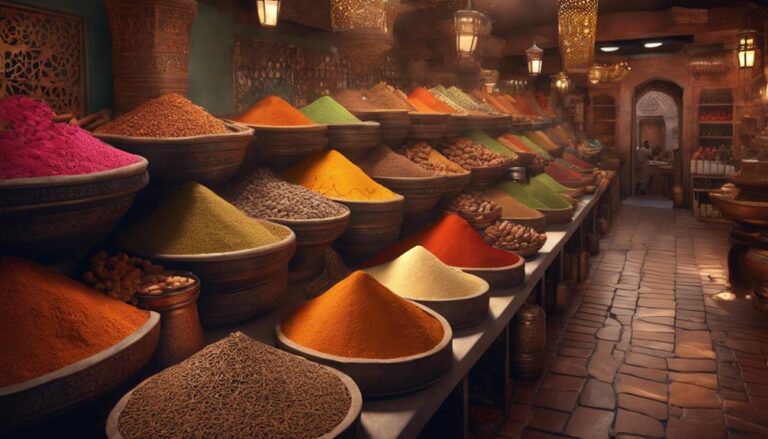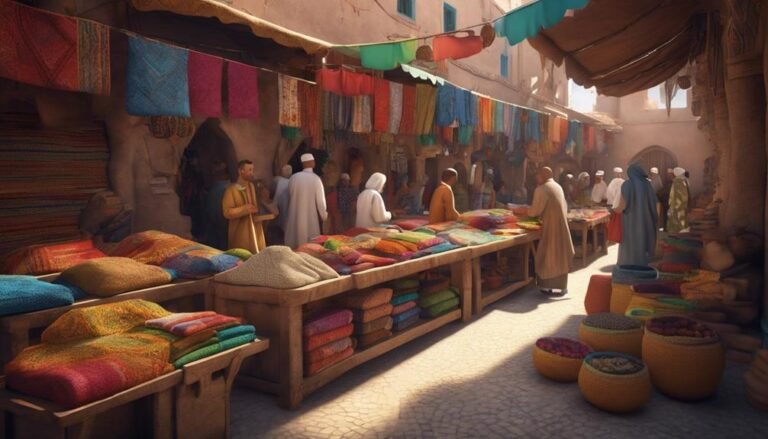Morocco's major exports include agricultural products, textiles, phosphates, automotive components, aerospace technologies, minerals, olive oil, and more. These diverse exports play an essential role in the country's robust export economy. Agriculture, textiles, and phosphates are significant sectors driving Morocco's export growth. The automotive and aerospace industries showcase innovation and competitiveness. Mineral exports, including phosphates, lead, zinc, and barite, contribute substantially to Morocco's GDP. Olive oil exports uphold high-quality standards. These exports collectively fuel Morocco's economic growth and create job opportunities. Morocco's export portfolio reflects a strategic focus on sustainability and industry viability.
Key Takeaways
- Agricultural exports, including organic products, drive Morocco's economy.
- Textile and clothing industry's sustainability initiatives enhance global competitiveness.
- Morocco is a major player in the global phosphate market.
- Automotive exports and aerospace industry contribute significantly to Morocco's economy.
- Olive oil exports meet high-quality standards, boosting Morocco's trade balance.
Agricultural Exports
A significant portion of Morocco's exports consist of agricultural products, showcasing the country's rich diversity in crops and produce. Morocco's agricultural sector benefits from advanced irrigation techniques, contributing to efficient water conservation practices. This approach guarantees sustainable water usage, crucial in regions where water scarcity is a concern.
Organic farming plays a key role in Morocco's agricultural exports, with a growing emphasis on sustainable practices. The commitment to organic farming aligns with global trends towards healthier and environmentally friendly produce. By adopting sustainable practices, Morocco not only meets international standards but also takes steps towards a more environmentally conscious agricultural sector.
The combination of innovative irrigation methods and a focus on organic and sustainable farming practices positions Morocco as a significant player in the global agricultural export market. This strategic approach not only enhances the quality of Moroccan agricultural products but also contributes to the country's economic growth and stability.
Textile and Clothing Exports
Textile and clothing exports play an important role in Morocco's economy. The industry impact of these exports can be seen in the country's growing global market share.
Understanding the dynamics of this sector is vital for evaluating Morocco's economic growth and international trade relationships.
Industry Impact
The impact of Morocco's textile and clothing exports on the industry's growth and sustainability is significant. These exports play an essential role in job creation, providing employment opportunities for many individuals within the country.
The textile and clothing sector in Morocco has been implementing sustainability initiatives to guarantee the long-term viability of the industry. By focusing on eco-friendly practices, such as using organic materials and improving waste management, Moroccan textile and clothing exports are aligning with global trends towards sustainability. This not only benefits the environment but also enhances the industry's competitiveness in the international market.
The commitment to sustainable practices not only fosters growth but also positions Morocco as a responsible player in the textile and clothing sector.
Global Market Share
Morocco's textile and clothing exports hold a notable position in the global market share, reflecting the industry's growing influence and competitiveness. The country's competitive advantage lies in its ability to offer a diverse range of quality products at competitive prices.
Global trends, such as the increasing demand for sustainable and ethically produced textiles, have also played a significant role in shaping Morocco's exports. The country has adapted to these trends by investing in sustainable practices and promoting transparency throughout its supply chain.
Phosphate Exports
Morocco stands as a significant player in the global phosphate market, boasting substantial phosphate production figures.
As you explore this topic further, consider the intricate relationship between Morocco's phosphate exports and the ever-evolving global demand for this essential mineral.
The economic implications stemming from Morocco's phosphate exports reverberate on both domestic and international scales, shaping the country's economic landscape.
Phosphate Production Overview
With its significant global market share, phosphate production in Morocco plays a pivotal role in the country's economy. Morocco possesses around 75% of the world's known phosphate reserves, making it the largest exporter of phosphate.
The country's phosphate production is essential in meeting global demand for fertilizers, as phosphates are vital for plant growth. However, the industry also raises concerns about its environmental impact and sustainability.
Mining activities can lead to soil erosion, water pollution, and habitat destruction if not managed properly. Hence, there's a growing need for sustainable practices in phosphate production to mitigate these negative effects and ensure the long-term viability of the industry.
Global Phosphate Demand
The global demand for phosphate, driven by the need for fertilizers essential for agricultural production, remains a significant factor influencing international trade patterns. Fertilizer demand is a key driver of the phosphate market, with the majority of phosphate production used in fertilizer manufacturing. Global markets heavily rely on phosphate exports from countries like Morocco to meet the needs of agricultural sectors worldwide.
However, the environmental impact of phosphate mining and production has raised concerns, prompting a shift towards more sustainable practices. Sustainable phosphate mining practices are gaining traction to mitigate environmental degradation and secure a stable supply of phosphates for future generations.
Balancing fertilizer demand with sustainable production methods is vital for meeting global agricultural needs while preserving the environment.
Economic Impact of Phosphates
The economic importance of phosphate exports resonates beyond global fertilizer demand, impacting trade dynamics and financial stability in various markets. Morocco, as a major phosphate exporter, plays a vital role in the global economy. The economic impact of phosphate exports extends to contributing greatly to Morocco's GDP and foreign exchange earnings. Additionally, the industry provides employment opportunities and infrastructure development within the country.
However, challenges related to environmental sustainability arise due to the intensive mining processes involved in phosphate extraction. Balancing economic benefits with environmental concerns is essential for the long-term viability of the phosphate industry. Implementing sustainable practices and technologies is crucial to mitigate the environmental impact while ensuring continued economic growth from phosphate exports.
Automotive Exports
One significant aspect of Morocco's exports is its automotive industry, which plays an essential role in the country's economy. The automotive sector in Morocco has been witnessing substantial growth and development, contributing notably to the nation's export industry.
Here are some key points regarding the automotive exports from Morocco:
- Automotive Innovation: Morocco has been focusing on automotive innovation, aligning its industry with global market trends to produce high-quality vehicles and automotive components.
- Market Trends: By staying abreast of market trends, Morocco has been able to adapt its automotive exports to meet the evolving demands of consumers worldwide.
- Trade Partnerships: Establishing strong trade partnerships has been critical for Morocco's automotive exports, enabling the country to access new markets and diversify its export destinations.
- Supply Chain Dynamics: The efficient management of supply chain dynamics has allowed Morocco to enhance the competitiveness of its automotive exports on the global stage.
Aerospace Exports
With a growing emphasis on technological advancements and global competitiveness, Morocco's aerospace exports have been steadily gaining momentum in the international market. The country has been making notable strides in the aerospace industry, particularly in the fields of space exploration and aviation technology. Morocco's commitment to investing in research and development has positioned it as a key player in the aerospace sector.
In recent years, Morocco has focused on increasing its presence in space exploration endeavors. The country has been actively participating in international space missions and collaborations, showcasing its capabilities in satellite technology and space research. This hasn't only boosted Morocco's reputation in the global aerospace community but has also opened up new opportunities for economic growth and technological innovation.
Moreover, Morocco's advancements in aviation technology have further solidified its position as a competitive aerospace exporter. The country's production of aircraft components, avionics systems, and maintenance services has garnered attention from international markets, contributing significantly to its aerospace export portfolio. As Morocco continues to invest in its aerospace industry, the future looks promising for its role in the global aerospace market.
Electronics Exports
When examining Morocco's electronics exports, it's essential to consider the top electronic products being exported, the key market destinations for these goods, and the prevailing growth trends in the electronics sector.
By analyzing these aspects, you can gain valuable insights into the country's competitive position in the global electronics market and its potential for further expansion.
Understanding the specific electronic products driving Morocco's export economy and the evolving demand patterns across different regions is vital for strategic decision-making in this sector.
Top Electronic Exports
Among Morocco's major exports, the top electronic exports play a substantial role in driving the country's economy. Morocco's electronic exports benefit from tech innovations and compliance with export regulations, contributing to the country's economic growth. Here is a list highlighting the top electronic exports:
- Smartphones: Morocco's electronic industry excels in smartphone production, meeting global demands.
- Telecommunication Equipment: The export of telecommunication devices showcases Morocco's technological capabilities.
- Computer Components: Morocco's computer component exports demonstrate the country's expertise in technology manufacturing.
- Electronic Appliances: The export of electronic appliances boosts Morocco's economy, catering to various international markets.
These electronic exports not only showcase Morocco's industrial prowess but also contribute significantly to its economic development.
Market Destinations for Electronics
Morocco's electronic exports find diverse market destinations worldwide, demonstrating the country's expanding reach in the global electronics market. When analyzing market destinations for electronics, consumer behavior plays an essential role in determining the success of these exports. Understanding consumer preferences and trends in different regions helps in tailoring products to specific market demands. Additionally, efficient supply chain and logistics management are vital for ensuring timely delivery and maintaining competitiveness in the global market. By strategically managing the supply chain, Moroccan electronic exporters can optimize costs and improve overall operational efficiency. The table below illustrates some key market destinations for Morocco's electronics exports:
| Market Destinations | Percentage of Exports |
|---|---|
| Europe | 45% |
| USA | 30% |
| Africa | 15% |
| Middle East | 5% |
| Asia | 5% |
Growth Trends in Electronics
The growth trends in electronics exports showcase an upward trajectory, reflecting Morocco's increasing presence in the global market. This growth is fueled by a combination of tech innovation and market competition. Here are key points to take into account:
- R&D Investment: Morocco's focus on research and development in electronics has led to the creation of cutting-edge products, boosting export potential.
- Supply Chain Efficiency: Streamlined supply chains have enabled Moroccan electronics to reach global markets more efficiently, enhancing competitiveness.
- Diversification Strategies: Morocco's strategic approach to diversifying its electronics offerings has attracted a broader customer base, driving export growth.
- Quality Standards: Adherence to international quality standards has positioned Moroccan electronics as reliable and high-quality products in the global market.
Chemical Exports
Chemical exports from Morocco play an important role in the country's overall export industry, contributing to its economic growth and global trade presence. The sector has seen notable advancements in chemical innovations, with Moroccan companies developing new products and processes to meet international market demands. Export regulations governing the chemical industry in Morocco are designed to guarantee product quality, safety, and compliance with global standards, thereby enhancing the country's reputation as a reliable supplier in the global market.
Morocco's chemical exports encompass a diverse range of products, including fertilizers, phosphoric acid, and refined petroleum products. These exports are vital for the country's economy, generating substantial revenue and providing employment opportunities. The chemical sector's growth is further supported by ongoing investments in research and development, aimed at fostering innovation and competitiveness in the global market.
With a strategic focus on quality, sustainability, and technological advancement, Morocco's chemical exports are well-positioned to continue expanding their market share and contributing significantly to the country's export-driven economy.
Fish and Seafood Exports
Experiencing steady growth and economic significance, fish and seafood exports from Morocco contribute significantly to the country's export industry. The fishing industry in Morocco has been a cornerstone of the economy for decades, with a strong focus on sustainable practices to guarantee the longevity of marine resources. Seafood market trends indicate a rising demand for Moroccan fish products globally, driven by their high quality and freshness. Here are some key points to ponder:
- Diversification: Morocco has diversified its fish and seafood exports to include a wide range of products such as sardines, octopus, and shrimp, catering to various international markets.
- Market Expansion: The country has strategically expanded its reach to new markets in Europe, the United States, and Asia, boosting export volumes and revenue.
- Quality Standards: Morocco adheres to strict quality control measures and certifications, enhancing the reputation of its fish and seafood products in the global market.
- Economic Impact: The revenue generated from fish and seafood exports plays a crucial role in supporting local coastal communities and driving economic growth in Morocco.
Olive Oil Exports
With a notable focus on sustainable practices and market diversification in fish and seafood exports, Morocco now showcases its prowess in the olive oil export industry. The country's commitment to environmental sustainability and organic farming has greatly contributed to the growth of its olive oil sector. Morocco's olive oil is highly regarded for its quality and health benefits, making it a sought-after product in international markets.
The rise in demand for olive oil can be attributed to its association with the Mediterranean diet, which is known for its various health advantages. Olive oil is rich in antioxidants and healthy fats, making it a staple in many kitchens worldwide.
Morocco's strategic location, favorable climate conditions, and dedication to traditional cultivation methods have positioned it as a key player in the global olive oil market. The country continues to invest in modern production techniques while preserving its heritage of olive farming, ensuring a sustainable and prosperous future for its olive oil exports.
Mineral Exports
Positioned as a significant contributor to Morocco's economy, mineral exports play a crucial role in the country's trade dynamics. The mining industry in Morocco thrives on its abundant natural resources, allowing the nation to capitalize on various minerals for export.
Here are some key points to ponder regarding Morocco's mineral exports:
- Diversification: Morocco's mineral exports encompass a diverse range of products including phosphates, lead, zinc, and barite, providing a solid foundation for the country's export portfolio.
- Economic Impact: The revenue generated from mineral exports significantly contributes to Morocco's GDP, enhancing economic growth and stability.
- Global Demand: Morocco's mineral exports cater to a global market, with countries around the world relying on the nation's mineral resources for various industrial purposes.
- Investment Opportunities: The flourishing mining industry in Morocco presents lucrative investment opportunities for both domestic and foreign investors, further stimulating economic development in the country.
Conclusion
To sum up, Morocco's major exports span a variety of industries, showcasing the country's diverse economy.
One interesting statistic is that in 2020, Morocco exported over 2.5 billion euros worth of phosphate, making it one of the largest phosphate exporters in the world.
This highlights Morocco's significant role in the global market for this essential mineral.

The Editorial Team is a passionate group of Morocco enthusiasts dedicated to sharing the beauty, culture, and wonders of this captivating country. With diverse backgrounds and a deep love for travel, we strive to bring you engaging and informative content that inspires your Moroccan adventures. From uncovering hidden gems and sharing local insights to exploring mouthwatering cuisine and showcasing the vibrant lifestyle, our team is committed to providing you with valuable resources and exciting stories that enhance your exploration of Morocco. Join us on this journey as we celebrate the rich heritage and unforgettable experiences that make Morocco truly special.







